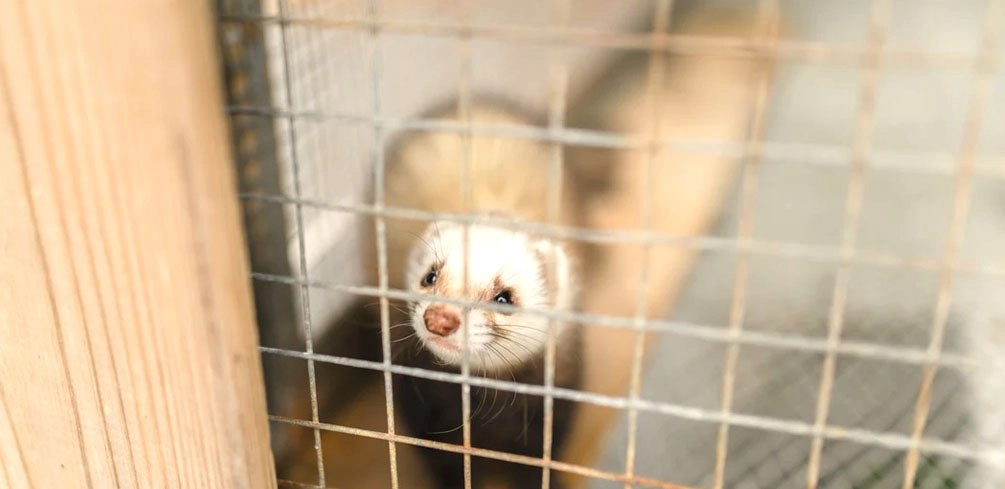Ferrets are clean creatures that love to do self-grooming, leading to hairballs in their digestive systems. Hairballs are balls of fur in the ferret’s digestive system resulting from ferrets swallowing some hairs when grooming. Since their digestive systems are meant to process hair, it may be hard to hair out of their digestive systems.
There are preventive measures that ferret owners can do to ensure their pets do not develop hairballs. Also, it will save you an emergency trip to see your vet because hairballs cause severe digestive systems.
When to Do Ferret Hairballs Develop?
Ferrets can develop hairballs any time of the year, but they are likely to develop some in spring when shading their long winter furs. It is natural for ferrets to shed hair in spring in preparation for the summer heat.
Many ferrets will lick themselves and their companions as a way to groom their fur.
Therefore, you need to be vigilant when your ferrets are shading fur to keep the environs clean all the time. Also, you can increase your efforts for hairball prevention several times a week to ensure any stray hairs are excreted from your pet’s system.
Hairballs tend to block a ferret’s digestive system, and some can tear their small intestines. In rare cases, hairballs cause the intestines to twist. Ferret hairball conditions need urgent medical attention, or you will lose your pet in several hours.
Signs of Ferret Hairball Issues
Some signs can tell you whether your ferret has hairballs or not. It would be best if you took your ferret immediately to the doctor for a diagnosis. Don’t attempt to medicate your pet with over-the-counter medicines.
Also, don’t wait around for a few hours hoping that the situation will change and your pet ferret will get better. Here are the signs you should not.
Loss of Appetite
Ferrets don’t eat when they have digestive issues, and a hairball will lead to loss of appetite. Ferrets need to eat a lot because their metabolisms are high, and skipping meals will lead to rapid weight loss.
If your ferret has been shading fur and not eating, there is the likelihood that they have a hairball. Take your ferret to the vet’s as soon as possible for medical attention.
Vomiting or Dry Heaving
A ferret may have an appetite for food, but it won’t keep it down when there is a blockage in its system. Therefore, you need to pay attention when you see your ferret vomiting what it is eating.
Alternatively, a ferret may lose their appetite but dry heave as if attempting to remove something in its system. Dry heaving is a clear sign that your ferret is experiencing blockage in its digestive system.
If you determine it is not a hairball lease check to make sure he doesn’t have the Aleutian flu.
Presence of Hair in Stool
A mild sign of the presence of ferret hairballs is the presence of hair or strings in the stool of your ferret. You should take your ferret to the vet even if they seem to be healthy.
The presence of hair in feces is an early sign that pet owners miss. The stool can appear like tiny droplets with strings in between. Don’t use ferret laxatives because you may know the hairball status, and ferret lax can make the situation worse.
What Happens After Noticing the Hairball Signs?
Take your ferret to a vet when you notice any of the signs above. Some ferrets can have swelling in their stomachs or stop moving. A vet will provide you with the best course of action depending on the situation.
Some situations can be fatal, and your pet will have a slight chance of survival under medication. However, your pet can get well soon when you take action immediately you notice signs of hairballs.
A vet can opt to diagnose your ferret depending on the sign that it is exhibiting. In some cases, your vet will request an x-ray to get a closer look at the hairball.
An x-ray is necessary when your pet is showing severe signs that may signify complications. X-rays help vets to confirm a diagnosis or change it, depending on the results.
Ferret Hairball Treatment Methods
A vet may recommend a ferret laxative, which looks like a paste, to help remove a hairball. A laxative is a suitable solution when the hairball is in the ferret’s stomach. You can administer it directly to the pet’s mouth or place it next to the food bowl.
Another treatment method is surgery to remove the hairball. Surgery is necessary when there is a chance that a hairball in the stomach will cause blockage in the intestines.
Intestinal blockage is adverse to ferrets. Also, performing stomach surgery is straightforward compared to intestinal surgery. Overall, the best course of action will be up to your veterinarian to decide.
Ferret Hairball Prevention
Staying vigilant during winter can save you a trip or two to the vet because of ferret hairballs. There are four popular methods for preventing ferret hairball development. All the methods are simple to perform on your pet.
Brush Your Ferret
You can use a soft brush to remove any excess hair on your ferret so that it doesn’t ingest hair when self-cleaning. You can find soft brushes at your local pet store. Run the brush at the back of your hand to ensure that it isn’t rough.
You can brush your ferret once or twice a week to remove any hair stuck on the coat. Clean the brush and dispose of any excess ferret fur safely. You may have to clean the brush one or two times during your session with your pet. If you have multiple ferrets, you need to brush all of them.
Wash Your Ferret
Washing a ferret once a week is an excellent way to eliminate excess fur and any stench your pet may be emitting. Use a shallow basin and handle your pet with care during the bath.
Wipe down your ferret to remove any hair remaining after a bath. It would be best if you did weekly baths for your ferrets until they stop shading.
Clean Their Habitat
Cleaning ferret blankets and their living space significantly reduces the odds of ingesting hair. Use a vacuum to clean their living areas and the house to get rid of all the hair.
You can vacuum the blankets and wash them to ensure they are clean. It would help if you cleaned ferret blankets every two weeks, but you can do them once a week when they are shading hair.
Hairball Remedy
Many ferret owners prefer to use over-the-counter or prescription hairball remedies to prevent the development of ferret hairballs. Most medications are added to the pet’s food to ensure any hair in the stomach or intestine is excreted.
You can add some pumpkin to the diet alongside hairball remedies.
Increase the frequency of home remedies when ferrets are shading hair. If you have several ferrets and only one is shading hair, you need to include the medication in all your ferret’s meals. Ferrets groom each other, and they can develop hairballs for another ferret’s fur.
Give pets a remedy 2-3 times a week when one pet ferret is shading. You can ask your vet for recommendations before buying a remedy. Be careful not to overdo the treatment because ferret digestive systems are delicate.
Conclusion
Ferret hairball prevention is a crucial endeavor that can save your pet from a world of pet. You only need four prevention measures to keep your pet safe.
Call a vet as soon as you see signs of a ferret hairball that your pet is exhibiting—urgent medical attention as they can die from digestive issues in a matter of hours.
Whatever you do, don’t attempt to medicate your pet ferret without authorization from a vet. You may make the situation worse. Overall, many ferrets recover from hairballs with the proper treatment method.
Please be careful and use at your own risk
None of the authors, contributors, administrators, or anyone else connected with PetNudge.com, in any way whatsoever, can be responsible for your use of the information contained in or linked from these web pages.

